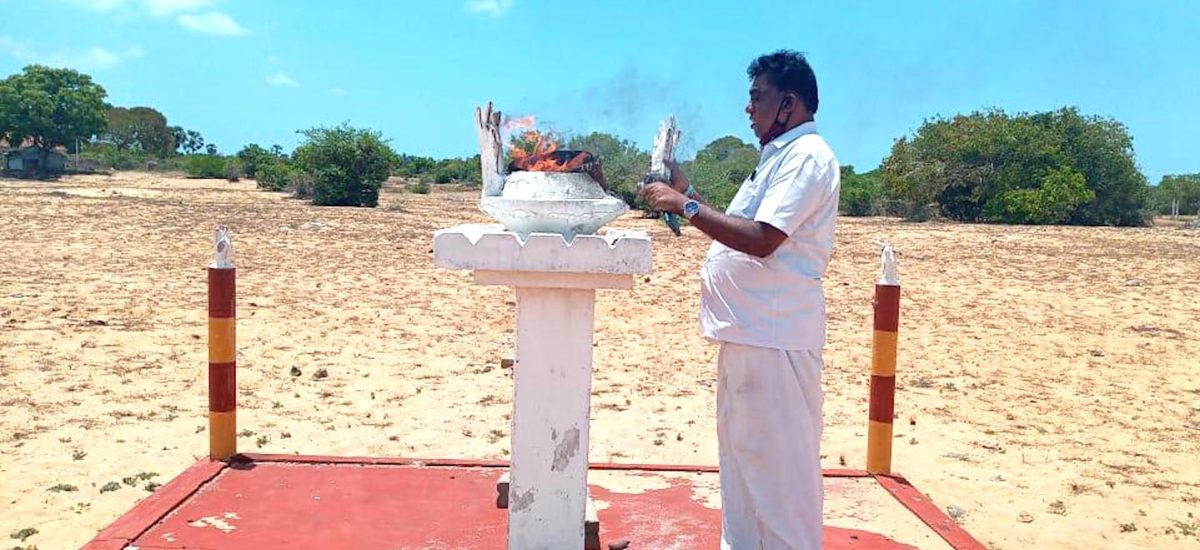Photo courtesy of Kumanan Kanapathippillai
Over three decades of civil war has touched the lives of Sri Lankans of all ages, all races and all social classes. Fathers, sons, daughters and wives were killed in action while others they were wounded and thousands who returned were forced to live the rest of their lives with the physical and mental scars of war.
Yet for many of us, war is a phenomenon seen through the lens of a television camera or a journalist’s account of fighting in distant parts of the world. Our closest physical and emotional experience may be the discovery of wartime memorabilia in a family attic. But even items such as photographs, uniform badges, medals and diaries can seem vague and unconnected to the life of their owner. For those of us born during peacetime, all wars seem far removed from our daily lives.
We live in a country that only celebrates the victory of war and where people who have committed mass crimes are not punished but allowed to walk on the streets. They are the ones who sit on the thrones today and make laws for the country. This war-torn country has been pushed to the point where it cannot reach the premise of restoring justice.
There are four essential elements in restoring justice to victims of terrible crimes:
- Acknowledge the crime
- Condemn the actions that led to it
- Compensate the survivors
- Remember what happened so that the actions are not repeated
Acknowledging what has happened helps individuals and countries to come to terms with the past and to move on socially, politically and economically. An acknowledgment might be a formal apology by a state. In South Africa after the apartheid era, in Morocco, Chile and Argentina and in the former Yugoslavia, the process of acknowledging responsibility for atrocities has been greatly helped by truth and reconciliation processes.
Injustices cannot be remedied if they are not acknowledged. The suffering of the Roma people is barely acknowledged. If it was, perhaps governments across Europe might take stronger measures to assist a people whose memories are still raw and do more to stamp out continuing discrimination against them.
In our country we still do not take accountability for the crimes. The government does not admit to the wrongdoings and crimes committed on its part. Governments have spent the past 12 years debating the grounds for justifying crimes.
When crimes are committed, there is a need for a full investigation and for those responsible to be condemned and brought to trial. The government has not presented any information on the disappearances of those who surrendered in the final battle and even during the war.
Compensation is for all affected parties. But even today some people are still living in camps while the army occupies their land.
Without acknowledgement, condemnation, compensation and remembrance, it is likely that the memory of injustice and mass human rights violations will be used to justify actions. The manipulation of collective memories for the purpose of national political agendas remains a serious threat across the North and East.
We are compelled to try to connect communities and focus on repairing that harm through a process of remembrance in an environment where the whole structure of restorative justice is distorted.
Therefore, we must remember. Only through remembrance can we save history. Only through remembrance can we heal our wounds. Remember the comrades who died for land, for their homes and families and friends, for a collection of traditions they cherished and a future they believed in. The meaning of their sacrifice rests with our collective national consciousness.
The connection between remembrance and human rights ought to extend both backwards and forwards in time. Terrible events that have been brought about through human action or inaction deserve to be remembered partly as a sign of respect to the victims who perished or otherwise suffered. Yet the forward looking aspect of remembrance is equally important, and much more often neglected, particularly when it involves the need to recognize our own role in causing terrible events.
Official remembrance is normally organized by governments and governments are not always prepared to admit to past mistakes or to having undertaken actions that have had severe consequences in terms of human rights. Governments tend to remember their own victories and their own victims but they very rarely acknowledge the victims of other races.
If remembrance is to help us avert future mass violations of human rights, we need to be honest about looking at ourselves. We need to be aware of the consequences of official policies in our country that may bring about violations of human rights. We need to acknowledge mistakes we may have made in the past and notice those we may be committing now. Only then can we begin to learn from them.
People who have lost memories are those who have lost their identity. Not only the future of those who have forgotten the past, but also the future, is dark.
Kenyan writer and academic Ngũgĩ wa Thiong’o says, “A people without memory are in danger of losing their soul.”


